
Shein Mompremier in a scene from "Ludi." Courtesy: Bantufy Films.
The black and white images brightened the laptop screen, and a thought lodged in my mind like a popcorn kernel stuck between my teeth. “What if this is the future of film viewing?” I tried to brush off my id's impertinence and poor timing. After all, I wasn't quite done with my movie viewing marathon, and I had a looming deadline.
But no, my mind would not shut up. “Think about it. Every time you go to the movies, you find a handful of people at most. The days are numbered for moviegoing purists like yourself.”
Quiet, I almost whispered out loud. In my mind's eye, I growled the word through gritted teeth, my facial expression the kind of stern disapproval you expect from a librarian. I was nearly an hour into “Time,” Garrett Bradley's searing first-person account of raising a family while your significant other is serving a prison sentence, and the last thing I wanted, as I sat at the rectagular table in the center of the Miami Shores Starbucks, was to take an existential detour into the status of the moving image circa 2020.
And yet, how could I not dwell on the film industry's uncertain future? The news cycle was beginning to hinge around that virus from overseas that was making our way to the States. I did not know it at the time, but I was dangling on the edge of a precipice. We all were. Life as we knew it was about to turn into an emotional roller coaster, teetering between the tedium of lockdown and the horrors of a rising death count.
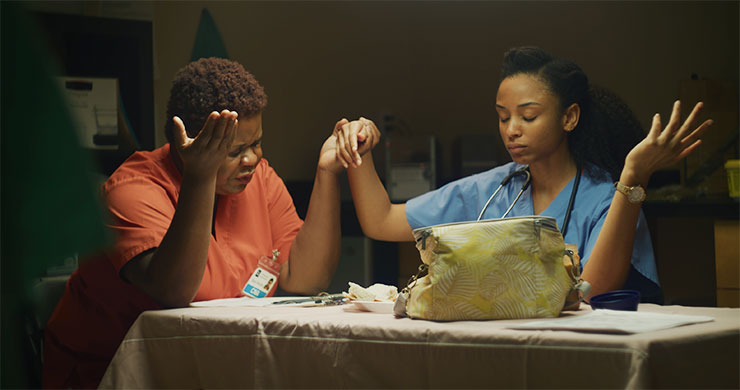
Kerline Alce and Shein Mompremier in a scene from "Ludi." Courtesy: Bantufy Films.
The 37th Miami Film Festival was unspooling at the time the first cases of COVID-19 were being reported in South Florida. The show did go on for several days, perhaps a little longer than it should have, but the event wrapped up a little ahead of schedule, the rest of 2020 a dark, ominous cloud that threatened to consume everything in its path, not unlike The Nothing in “The Neverending Story.”
Here we are, a year later, physically and emotionally scarred, faced with the start of the festival's 2021 edition, which is taking place come hell or high water, March 5-14. MFF's organizers know that not everyone is ready to return to an indoor auditorium to see a movie, so they have put together a hybrid event, retaining the traditional in-theater experience while making most of the lineup available virtually the day following their screenings at the Silverspot Cinema in downtown Miami. Some titles, including “The Human Voice,” a new short from Pedro Almodóvar that also marks his English-language debut, as well as the Miami and Havana-set documentary “Revolution Rent,” will only be featured on the big screen, but local movie buffs will have the option to view the lion's share of the 2021 program at home.
The question that arises, one I don't see being discussed in media coverage of the festival, is whether or not it's too early to host in-theater screenings. After all, the vaccination rollout is still in its early stages, and the Florida Department of Health is still reporting thousands of new infections a day.
Why the need the tiptoe around the subject? This is a conversation that should be had openly, one I have grappled with internally for the past several months. Suffice it to say, no film is worth putting your health at risk. On the other hand, senior residents, first responders and essential workers who have been fully vaccinated should be given the choice to go to the movies in a festival setting.
As far as offering my two cents about this matter, that's about the extent of it at this juncture.
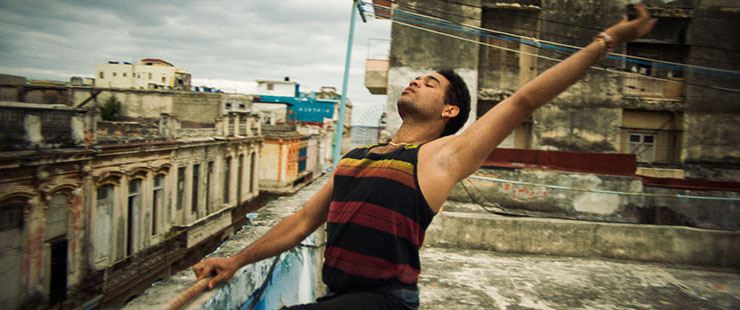
Yonah Acosta in a scene from "Sin La Habana." Courtesy: GQue Films.
What about this year's lineup? As in past editions, there is a heavy emphasis on the Caribbean experience, both in made-in-Miami projects and productions from Latin America. A strong presence of documentaries on this very subject recalls the nonfiction-heavy stint of former festival director Nicole Guillemet. But Jaie Laplante, MFF's executive director and co-director or programming, and the rest of the programming team have not neglected to include a reasonable portion of international and American independent titles. Alas, my eternal gripe of not enough East Asian selections or animation remains.
I have selected four titles screening this weekend for a closer look. For those planning to be a part of this year's festival, happy viewing, at home or at the movies.
“Ludi”: It's easy to see why this compact, day-in-the-life drama was picked as the Opening Night selection. It centers around a Haitian immigrant who is a nurse, and also features a Cuban American woman and a retired Jewish man as secondary characters. In other words, it's Miami to the max, only in miniature. The good news is that director and co-screenwriter Edson Jean, here making his feature debut, refuses to turn his protagonist's story into a issue-driven narrative. The bad news is that all the best stuff is in the film's superior first half.
Ludi Alcidor (Shein Mompremier) is recording an audio cassette to send to her family back home as she gets ready for her shift at a nursing home. Yearning for her homeland, an obligation to send money to loved ones and daily struggles to make ends meet are all encapsulated in the space of several minutes. It's a revealing snapshot of an opening scene, fluidly doling out exposition with judicious storytelling economy.
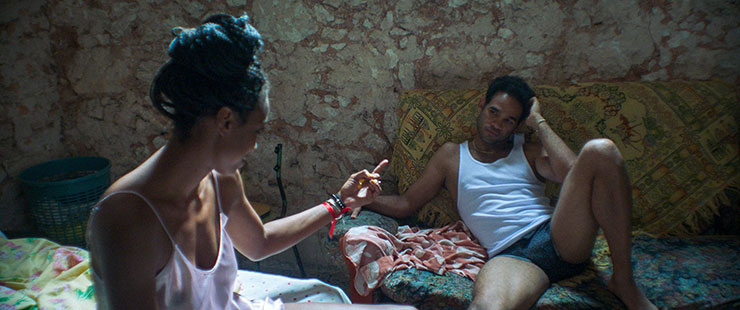
Evelyn Castroda O'Farrill and Yonah Acosta in a scene from "Sin La Habana." Courtesy: GQue Films.
Blanca (Madelin Marchant),who owns the Little Haiti home where Ludi rents a room, is also a front-line worker. She dangles the prospect of a gig on the side to her tenant, even though it goes against her current employer's regulations. Blanca specializes in a kind of passive aggressive guilt trip that will likely resonate with many South Florida viewers. Off Ludi goes to catch the mini bus, in a running montage that shows editor Jonathan Cuartas channeling some heavy “Run Lola Run” vibes.
“Ludi” hits its stride when the titular character interacts with her co-workers. Jean and co-screenwriter Joshua Jean-Baptiste have the gift of gab, and that makes the workplace banter come alive with naturalistic ease. The filmmakers weave a tapestry of South Florida life that captures the region's flavor without slipping into kitchen-sink miserabilism. In other words, “Ludi” has enough humor to prevent it from becoming too heavy while never losing sight of the protagonist's struggles.
That ensemble-driven balance the movie attains is disrupted when it changes gears at roughly the halfway point. Ludi's decision to take Blanca up on her offer, motivated by a need for to make extra dough, sends her on a collision course with George (Alan Myles Heyman), the crabby retiree who is ostensibly in her care for the night but who acts bewildered and surprised to see her at his apartment.
Give Jean credit for refusing to sentimentalize the fraught interaction between the two characters, but for the remainder of its running time, “Ludi” becomes an earnest two-hander, engaging enough but nowhere near as engrossing as the scenes that precede it, in particular a handful of interludes, shot in the 4:3 aspect ratio, set to voiceover narration of earlier cassette recordings that Ludi sent to her family in Haiti. Unlike the rest of the film, the latter portion could have taken place anywhere on the East Coast. It's worth a look, but “Ludi” is much stronger before it turns its back on the very elements that make it a distinctive South Florida story.
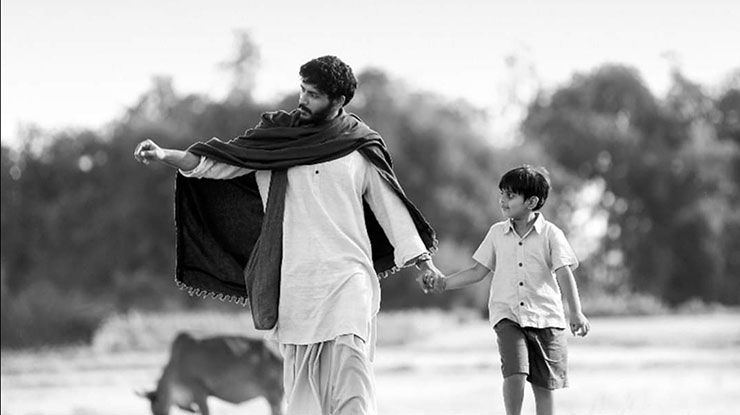
Arjun Chakrabarty in a scene from "The Wanderlust of Apu." Courtesy: Gaurang Films/Bhandarkar Entertainment.
- Silverspot screening date: Friday, May 5, 7 p.m.
- Virtual screening date: Available starting Saturday, May 6 at noon.
“Sin La Habana”: Cultural displacement also drives this over stylized co-production between Canada and Cuba. The story kicks into gear when gifted dancer Leonardo (Yonah Acosta) gets booted from his ballet company in Havana. His girlfriend Sara (Evelyn Castroda O'Farrill), an attorney, is keen to find a way out of Cuba and into a more prosperous life for them up north. Enter Nasim (Aki Yaghoubi), an Iranian-Canadian visitor who takes a liking to Leonardo when she takes one of his salsa classes. Sara, ever the pragmatist, sees in the lonely woman a possible ticket out of Cuba. So what if that involves convincing her boyfriend to seduce the older woman? The plan: have Leonardo marry Nassim so he can stay in Montreal, then send for Sara. A risky proposition, but to the young couple, the ultimate goals merit taking the plunge.
On paper, the romantic triangle, rife with the potential for all kinds of intriguing complications, appears to be an effective way to deal with thorny subject matter, such as the lack of opportunity for young Cubans and sex tourism. But director/co-screenwriter Kaveh Nabatian, here making his first solo feature, is too enamored of his multiple shooting formats and flashy camera moves to make us feel anything but frustration toward Sara and Leonardo. Their constant bickering, exacerbated by the actors' conspicuous lack of chemistry, makes it difficult for the viewer to want them to get back together.
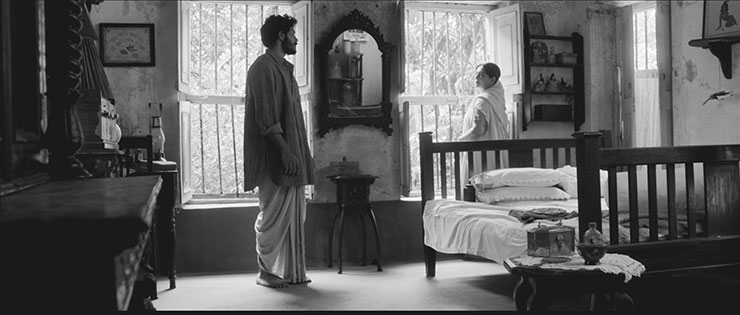
Arjun Chakrabarty and Sleerekha Mitra in a scene from "The Wanderlust of Apu." Courtesy: Gaurang Films/Bhandarkar Entertainment.
It doesn't help matters that Nabatian's depiction of Havana borders uneasily on exotic class tourism. His music video approach quickly wears out its welcome, and the myriad formal flourishes are more distracting than immersive. It feels like Wong Kar-wai without the rigor, “Black Orpheus” for the Nat-Geo crowd. There's only so long one can linger on a slo-mo shot of Sara holding a yellow umbrella before this critic rolls his eyes. The superficial brand of ethnographic exploration rubbed me the wrong way, it's safe to say.
Once the film shifts to the more muted landscapes of Quebec, “Sin La Habana” appears to finally quiet down, as we learn more about Nasim's Jewish family and her own baggage, but the characters remain off-putting wet blankets. Some supporting players, like an opportunistic Cuban man Leonardo meets in Montreal and Nasim's nosy but supportive sister, stand out because they actually feel like real people, far removed from the trio of sourpusses propelling the narrative. They're too often adrift in a sea of contrivances served up by a plot, based on a novel by Afro-Cuban hip-hop artist Pablo D. Herrera Veitia, that increasingly feels like a stale telenovela.
The film concludes with a striking sequence where all of its elements come together with poignant melancholy, and Acosta, a celebrated dancer in real life, gets an opportunity to flex his interpretive talents. It feels like the ending to a much better film, one not weighed down by stylistic overkill and insipid ennui.

Ingrid Garcia-Jonsson and Fernando Guallar in a scene from "My Heart Goes Boom!" Courtesy: Julio Vergne/Latido Films.
- Silverspot screening date: Sunday, March 7, 2:30 p.m.
- Virtual screening date: Available starting Monday, March 8 at noon.
“The Wanderlust of Apu” (“Avijatrik”): The urge to leave home and explore the world is something that knows no international borders, and when there is the well-being of loved ones to consider, it makes for a fascinating inner conflict. Director Subhrajit Mitra applies this dilemma to explore what is perhaps the best known character in Indian cinema. It takes massive confidence to want to make a sequel to Satyajit Ray's beloved trilogy about the mischievous country boy who became a dedicated student, who became a reluctant husband, who became a disillusioned nomad, who became an absent father, who discovered he could be a devoted dad after all. Why mess with the best movie trilogy of all time? (Sorry, “Star Wars” and “Lord of the Rings” fans, but this is as good as movies get.)
But here we are, more than six decades after “Apur Sansar” ("The World of Apu”) the third (and best) chapter of the trilogy, was made. There is a compelling reason to return to the world Ray brought to life with such unassuming beauty and care. Mitra has pointed out in interviews that there are about 150 pages' worth in “Aparajito,” the novel that the second and third installments in the trilogy were based on, that Ray did not film. Why not find out what happened to Apu and his 6-year-old son Kajol right after they finally came together?
Because “The Wanderlust of Apu” is a turgid snooze, a waste of appealing characters and a spellbinding setting. Plodding along at a pace that can charitably be called glacial, the film begins with a seemingly interminable train journey and doesn't pick up the slack thereafter. It also doesn't help that the film's widescreen black and white vistas fail to capture the original trilogy's intimacy, its clean video-y sheen making all surfaces look like unused movie sets.

Fran Morcillo, Veronica Echegui, Fernando Guallar and Ingrid Garcia-Jonsson in a scene from "My Heart Goes Boom!" Courtesy: Julio Vergne/Latido Films.
Mitra is too occupied having his characters cite poetry, including some Edgar Allan Poe verses, to find much insight into their journey. What we're left with is a wan trip down memory lane with frequent contemplative pauses. There is some depiction of Indian-British tensions on the eve of World War II, but Mitra's oppressively lyrical mise en scene leaves little room for tension. There's nothing wrong with waxing nostalgic about the past, but when you make a movie that's about nothing else, there's precious little room for enjoyment. You'd have to be a real Grinch, however, not to smile when you hear snippets of Ravi Shankar's score from the original trilogy sneaking their way into the soundtrack. Wait a minute, I am a Grinch. Skip this pretentious bore.
- Silverspot screening date: Saturday, March 6, 6 p.m.
- Virtual screening date: Available starting Sunday, March 7 at noon.
“My Heart Goes Boom!” (“Explota Explota”): There's no need to be a sucker for splashy, campy musicals to dig this buoyant treat from Spain, though it probably doesn't hurt. The first feature from Uruguayan-Spanish director Nacho Álvarez, the brother of prolific genre filmmaker Fede Álvarez, kicks into gear when María (Ingrid García-Jonsson) flees Rome in her wedding dress circa 1973. Is she a runaway bride, or was she stood up at the altar? In any case, as she arrives back in Madrid, the Spaniard shows the unmistakable signs of heartbreak. Cue the meet cute with handsome, straitlaced Pablo (cutie patootie Fernando Guallar), who helps dry her tears and even leaves a hankie behind.
It's not long before María's working the check-in counter at the airport, thanks to new roomie Amparo (Verónica Echegui), and lo and behold, she meets dream boy again, only he's lost his luggage. Quite by accident she discovers he works for Televisión Española (TVE), were he toils away as assistant to his dad, the censor in charge of ensuring the programming stays wholesome and buttoned up, even the dance extravaganza hosted by showbiz grande dame Rosa (Natalia Millán). As it happens, María has long wanted to become a dancer.
Okay, so “My Heart Goes Boom,” which aims to do for the music of Italian singer Raffaella Carrà what the “Mamma Mia!” movies did for ABBA, springs few surprises in the story department, but it's got charm to spare, and most refreshingly, the musical numbers don't strive for perfection. That down-to-earth simplicity, coupled with its vibrant palette, bright costumes and eye-popping sets, conspire to wear down your defenses. Its TV station setting and takedown of antiquated social norms turn it into an Iberian companion piece to Adam Shankman's “Hairspray,” and there are also some sweet nods to Jacques Demy's “The Young Girls of Rochefort” and even the Rock Hudson/Doris Day comedies.
It is a curious irony that this celebration of progressive values and self-expression is a thoroughly old-fashioned effort, just as the notion that the standout among this quartet of MFF selections ends up being the candy-colored rom-com. These days, though, we could all use a positivity boost, and “My Heart Goes Boom!” is the pick-me-up you never knew you needed. Don't let it pass you by.
- Silverspot screening date: Sunday, March 7, 3:30 p.m.
- Virtual screening date: Available starting Monday, March 8 at noon.
For more information about the rest of the lineup and tickets to the Miami Film Festival's hybrid 2021 edition, go to www.miamifilmfestival.com.


